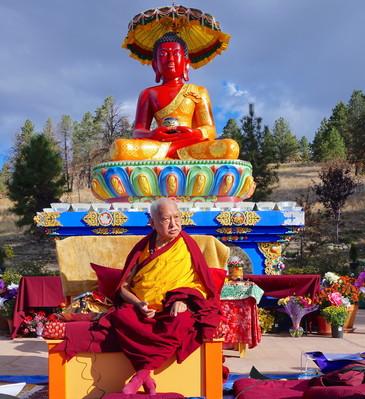The Buddha said,
The end of all that has been hoarded up is to be spent;
The end of what has been lifted up is to be cast down;
The end of meeting is separation;
The end of life is death.
These are the shortcomings of samsara. Now we are meeting here, but I don’t think it will take a long time before we separate. We meet now and then separate. After meeting, it ends up with separation. A family meets and then separates. The consciousness comes from different realms, and somehow, due to past karma, gathers in this house for some months or some years, clinging to somebody, thinking “my this,” “my that,” “my this,” “my that,” but in a very short while, there is the end of this meeting, the separation.
For however many months or years we are together, we cling to it, believing we are always going to be together like this. But at the end of the meeting is the separation. That is the shortcoming of samsara. And again the consciousness has to leave the body. The consciousness has to migrate to all sorts of realms. There’s a family here, but after some time the consciousness leaves to a different realm, after having just spent a short time together. That is the nature of samsara.
After becoming high in samsara, you see, we end up being lower down. It changes. Even within one life, we change from a high position to a low one.
Anyway, without expanding, after birth there’s death. That is the nature of life, that death can happen. There are so many people on this earth, even today, who are dying or already dead. So many people on this earth who are the same age as us, even those born on the same day, are dying today or already dead.
Therefore, death can happen to us any day, even today. Death can happen at any moment. If we think that death can happen at any moment, that many people exactly the same age as us are dying today—the minute we think that death can happen today, at this moment, suddenly there’s peace in our heart. We find peace. We suddenly find there is no meaning to all this expectation of getting more power, more wealth, more reputation. When we have a business worth a million dollars, we want a billion, and after a billion we want a trillion—this want goes on nonstop. Suddenly, all this doesn’t make sense; it has no meaning, we find no purpose in it. Then, we suddenly find so much peace in our heart.
Immediately we think of death [Rinpoche snaps his fingers] it cuts following desire, the negative emotional mind. Only when we think of the death, how death can happen even today, even this moment, we can immediately cut it; we can stop following desire. Immediately, there is unbelievable freedom. We achieve incredible peace in our heart.
It instantly stops us following desire and we have contentment. Right here and now we achieve contentment. The nature of the life is impermanence and death, and death can happen any day, even today, even this moment. This meditation on the nature of our own life, which is true, is the Buddha’s psychology. This meditation is the Dharma that protects us from desire, that frees us from all the confusion, all the problems caused by desire. We are protected.
The meaning of Dharma is “to hold,” and here remembering impermanence and death protects us, it holds us, it cuts desire immediately. It protects us not only from desire but also from the cause of desire and from all the problems that spread out more and more from that. We are protected from all of life’s problems and confusion, more and more.
The general meaning of existent, phenomenon, in Tibetan is called chö, which means holding its own nature. That is the definition of existent, chö, in Tibetan. Now here, this chö here, Dharma, means that which protects us. When our mind becomes Dharma, it protects us from all this confusion, all these sufferings such as depression, loneliness, suicidal thoughts. When our problems seem so heavy we can no longer handle them, we become suicidal. It protects us from all this, and it protects us from killing and causing so much harm to other sentient beings.































